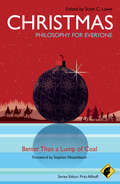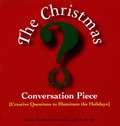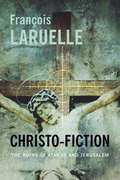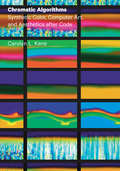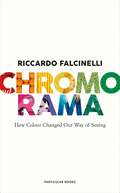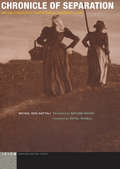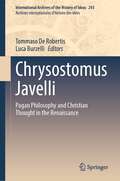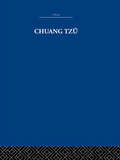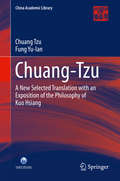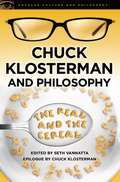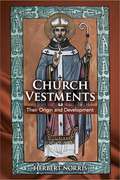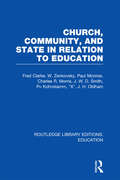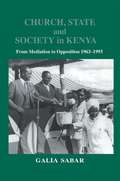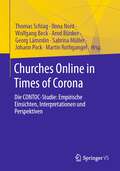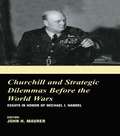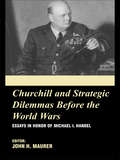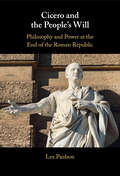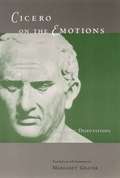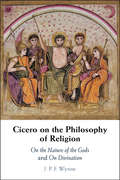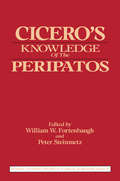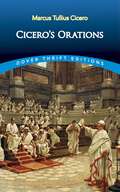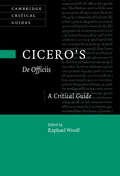- Table View
- List View
Christmas - Philosophy for Everyone: Better Than a Lump of Coal (Philosophy for Everyone #32)
by Fritz AllhoffFrom Santa, elves and Ebenezer Scrooge, to the culture wars and virgin birth, Christmas - Philosophy for Everyone explores a host of philosophical issues raised by the practices and beliefs surrounding Christmas. Offers thoughtful and humorous philosophical insights into the most widely celebrated holiday in the Western world Contributions come from a wide range of disciplines, including philosophy, theology, religious studies, English literature, cognitive science and moral psychology The essays cover a wide range of Christmas themes, from a defence of the miracle of the virgin birth to the relevance of Christmas to atheists and pagans
Christmas Conversation Piece
by Bret Nicholaus Paul LowrieWhat one Christmas tradition would you never want to give up? If you could spend Christmas anywhere in the world, where would you most want to be? If you could have visited the Christ child just as the Three Kings did, what would you have brought as a gift? You've been chosen to host a sensational Christmas celebration on TV: What three guests would you choose to make it the best Christmas special ever? The Christmas Conversation Pieceoffers these and many other questions to pose and ponder during a season of both deep reflection and unabashed merriment. This charming volume--the perfect stocking stuffer--will provide you, your family, and your friends with twelve days of surprising and amusing Yuletide questions. Who would you most like to meet under the mistletoe? Your answer just may change by Christmas Eve!
Christo-Fiction
by Robin Mackay François LaruelleFrançois Laruelle's lifelong project of "nonphilosophy," or "nonstandard philosophy," thinks past the theoretical limits of Western philosophy to realize new relations among religion, science, politics, and art. In Christo-Fiction, Laruelle targets the rigid, self-sustaining arguments of metaphysics, rooted in Judaic and Greek thought, and the radical potential of Christ, whose "crossing" disrupts their circular discourse. Laruelle's Christ is not the authoritative figure conjured by academic theology, the Apostles, or the Catholic Church. He is the embodiment of generic man, founder of a science of humans, and the herald of a gnostic messianism that calls forth an immanent faith. Explicitly inserting quantum science into religion, Laruelle recasts the temporality of the cross, the entombment, and the resurrection, arguing that it is God who is sacrificed on the cross so that equals in faith may be born. Positioning itself against orthodox religion and naive atheism alike, Christo-Fiction is a daring, heretical experiment that ties religion tightly to the human experience and the lived world.
Christo-Fiction: The Ruins of Athens and Jerusalem (Insurrections: Critical Studies in Religion, Politics, and Culture)
by François LaruelleFrançois Laruelle's lifelong project of "nonphilosophy," or "nonstandard philosophy," thinks past the theoretical limits of Western philosophy to realize new relations between religion, science, politics, and art. In Christo-Fiction Laruelle targets the rigid, self-sustaining arguments of metaphysics, rooted in Judaic and Greek thought, and the radical potential of Christ, whose "crossing" disrupts their circular discourse. Laruelle's Christ is not the authoritative figure conjured by academic theology, the Apostles, or the Catholic Church. He is the embodiment of generic man, founder of a science of humans, and the herald of a gnostic messianism that calls forth an immanent faith. Explicitly inserting quantum science into religion, Laruelle recasts the temporality of the cross, the entombment, and the resurrection, arguing that it is God who is sacrificed on the cross so equals in faith may be born. Positioning itself against orthodox religion and naive atheism alike, Christo-Fiction is a daring, heretical experiment that ties religion to the human experience and the lived world.
Chromatic Algorithms: Synthetic Color, Computer Art, and Aesthetics after Code
by Carolyn L. KaneThese days, we take for granted that our computer screens--and even our phones--will show us images in vibrant full color. Digital color is a fundamental part of how we use our devices, but we never give a thought to how it is produced or how it came about. Chromatic Algorithms reveals the fascinating history behind digital color, tracing it from the work of a few brilliant computer scientists and experimentally minded artists in the late 1960s and early '70s through to its appearance in commercial software in the early 1990s. Mixing philosophy of technology, aesthetics, and media analysis, Carolyn Kane shows how revolutionary the earliest computer-generated colors were--built with the massive postwar number-crunching machines, these first examples of "computer art” were so fantastic that artists and computer scientists regarded them as psychedelic, even revolutionary, harbingers of a better future for humans and machines. But, Kane shows, the explosive growth of personal computing and its accompanying need for off-the-shelf software led to standardization and the gradual closing of the experimental field in which computer artists had thrived. Even so, the gap between the bright, bold presence of color onscreen and the increasing abstraction of its underlying code continues to lure artists and designers from a wide range of fields, and Kane draws on their work to pose fascinating questions about the relationships among art, code, science, and media in the twenty-first century.
Chromorama: How Colour Changed Our Way of Seeing
by Riccardo FalcinelliThe Italian colour bible: a gorgeously illustrated exploration of colour and the modern gaze, from an award-winning designer'Fresh and exciting, like an unopened packet of coloured pencils. Countless thought-provoking facts to ponder over, beautifully written' Coralie Bickford-Smith, author of The Fox and the StarWhy are pencils yellow and white goods white? Why is black the colour of mourning? What connects Queen Victoria's mauve gown and Michelle Obama's yellow dress? In Chromorama, acclaimed graphic designer Riccardo Falcinelli delves deep into the history of colour to show how it has shaped the modern gaze. With over four hundred illustrations throughout and with examples ranging widely across art and culture - from the novels of Gustave Flaubert to The Simpsons, from Byzantine jewellery to misshapen fruit, from Mondrian to Hitchcock's thrillers - Falcinelli traces the evolution of our long relationship with colour, and how first the industrial revolution, and then the dawn of the internet age, changed it forever. Beautifully designed, deeply researched, and written with warmth and wit, Chromoroma is an engrossing account of shade and light, of tone and hue, of dyes, pigments, and pixels. It is the story of why we now see the world the way we do.
Chronicle of Separation: On Deconstruction’s Disillusioned Love (Idiom: Inventing Writing Theory)
by Michal Ben-NaftaliA unique feminist approach to the legacy of Jacques Derrida, Chronicle of Separation is a disparate yet beautifully interwoven series of distinct readings, genres, and themes, offering a powerful reflection of love in—and as—deconstruction. Looking especially at relationships between women, Ben-Naftali provides a wide-ranging investigation of interpersonal relationships: the love of a teacher, the anxiety-ridden bond between a mother and daughter as manifested in anorexia, passion between two women, love after separation and in mourning, the tension between one’s self and the internalized other. Traversing each of these investigations, Chronicle of Separation takes up Derrida’s Memoires for Paul de Man and The Post Card, Lillian Hellman’s famed friendship with a woman named Julia, and adaptations of the biblical Book of Ruth. Above all, it is a treatise on the love of theory in the name of poetry, a passionate book on love and friendship.
Chrysostomus Javelli: Pagan Philosophy and Christian Thought in the Renaissance (International Archives of the History of Ideas Archives internationales d'histoire des idées #243)
by Tommaso De Robertis Luca BurzelliThe volume provides the first book-length study of Chrysostomus Javelli’s philosophical works. An Italian university professor and a prominent figure in the intellectual landscape of sixteenth-century Europe, Javelli (ca. 1470-1540) was the author of insightful commentaries on both Plato and Aristotle as well as of original works in which he laid the foundations of a new Christian philosophy. In this volume, a group of leading scholars from around the world guide readers through the many facets of Javelli’s philosophical corpus, showing the long-term impact of his ideas on Western philosophical thought. The twelve essays of this volume shed light on an understudied yet central figure of Renaissance culture, revealing new connections and unexplored influences. This book is a valuable tool for students and scholars of early modern philosophy, classical tradition, and Christian theology, contributing to the understanding of a neglected chapter of Western intellectual history.
Chuang Tzu: Mystic, Moralist, And Social Reformer (classic Reprint)
by Herbert A GilesFirst published in 1889. This re-issues the second, revised edition of 1926. Chuang Tzu was to Lao Tzu, the author of Tao Tê Ching, as Hui-neng, the sixth Patriarch of Zen Buddhism, was to Bodhidharma, and in some respects St.Paul to Jesus; he expanded the original teaching into a system and was thus the founder of Tao-ism. Whereas Lao Tzu was a contemporary of Confucius in the sixth century B.C, Chuang Tzu lived over two hundred years later. He was one of the greatest minds produced by China; philosopher, metaphysician, moralist and poet. It is impossible to understand the spiritual depth of the Tao Tê Ching without the aid of Chuang Tzu.
Chuang Tzŭ: Taoist Philosopher and Chinese Mystic
by Herbert A. Giles Zhuang ZiChuang Tzŭ belongs to a period three or four centuries before Christ. A disciple of Lao Tzŭ, his writings, which as a consequence are mostly allegorical, are an attempt to refute the materialistic Confucian teaching that arose after Lao Tzŭ's death. Although Chuang Tzŭ failed in his aims, he left a work of marvellous literary beauty and great originality. This classic translation makes Chuang Tzŭ available to English readers with the aid of a running commentary incorporated in the body of the text.
Chuang-Tzu: A New Selected Translation with an Exposition of the Philosophy of Kuo Hsiang (China Academic Library)
by Chuang Tzu Fung Yu-LanThis book reprints an ancient Chinese work from the late Warring States period (3rd century BC) that contains stories and anecdotes exemplifying the carefree nature of the ideal Taoist sage. Chuang Tzu's philosophy represents the main current of Taoist teachings, and his text is widely regarded as both deeply insightful and a great achievement in the Chinese poetical essay form. The version presented was translated by Feng Yu-lan, the famous Chinese philosopher, who puts more emphasis on Chuang Tzu's philosophy than do previous attempts. William James once said that every great philosopher has a personal vision. When one has grasped that vision, the whole system can be easily understood. And Crocé once said that the greater a philosophical system is, the simpler the central idea. Although the present translation is limited to the first seven chapters of Chuang Tzu's writings, it accurately conveys his main vision and ideas.
Chuck Klosterman and Philosophy
by Seth VannattaSince he burst on the world with his heavy-metal memoir Fargo Rock City in 2001, Chuck Klosterman has been one of the most successful novelists and essayists in America. His collections of essays Sex, Drugs, and Cocoa Puffs and Chuck Klosterman IV: A Decade of Curious People and Dangerous Ideas have established Klosterman not only as a credible spokesman for intelligent purveyors of popular culture. His writings and regular columns (in Spin, Esquire, The New York Times Magazine and other venues) about music, sports, and modern culture have sometimes become themselves touchstones in popular culture. The success of his card-based game Hypertheticals: 50 Questions for Insane Conversations has demonstrated that Klosterman can connect with his fans and readers even off the printed page.As he writes in his contribution to this book, Klosterman "enjoys writing about big, unwieldy ideas" as they circulate in culture, in people, in music, and in sports. The twenty-two other philosophers writing alongside Klosterman couldn't agree more. They offer their own take on the concepts and puzzles that fascinate him and take up many of Chuck's various challenges to answer brain-twisting "hypertheticals" or classic ethical quandaries that would arise if, say, Aristotle wandered backstage at a Kiss concert.
Church Vestments: Their Origin and Development
by Herbert NorrisThe Christian church's earliest vestments were hardly distinguishable from the everyday dress of ordinary people in ancient Rome, but in time, ecclesiastical dress acquired its own distinguishing characteristics. This comprehensive reference by noted English costume authority Herbert Norris traces the evolution of clerical attire through the centuries until the end of the 1400s.The meticulously researched text is enhanced by more than 270 of the author's own illustrations, including 8 in full color, adapted from originals but specially redrawn to accentuate essential features of the garments. The vestments are treated in the approximate order of their appearance in liturgical ritual, beginning with the simple alb and including the pallium, chasuble, cassock, surplice, mitre, and many other items. Footwear, crosses, headgear, rings, gloves, and other accessories are also depicted and described in detail. Replete with fascinating historical facts and lore, this volume is an indispensable reference for students, scholars, and anyone interested in the history of ecclesiastical attire.
Church, Community and State in Relation to Education: Towards a Theory of School Organization (Routledge Library Editions: Education)
by Fred ClarkeThis volume was originally prepared for the World Conference on Church, Community and State held in Oxford in 1937. Its aim was to understand the nature of the vital conflict between the Christian faith and the secular tendencies of the early twentieth century, particularly in relation to education. The book also analyses the responsibilities of the Church in this struggle.
Church, State and Society in Kenya: From Mediation to Opposition
by Galia SabarThis volume offers a debate on the role of Christianity in post-colonial Kenya, charting the role of the church, state and society in the transformation of Kenya and the relationship between the three. It shows how the church initiated health, education, and economic activities, showing it to be a major instrument of transformation.
Churches Online in Times of Corona: Die CONTOC-Studie: Empirische Einsichten, Interpretationen und Perspektiven
by Wolfgang Beck Arnd Bünker Thomas Schlag Ilona Nord Georg Lämmlin Sabrina Müller Johann Pock Martin RothgangelDie CONTOC-Studie hat in ökumenischer und internationaler Ausrichtung die digitale kirchliche Praxis unter den Bedingungen der Corona-Pandemie im Frühsommer 2020 erforscht. Dieser Band dokumentiert die Rahmenbedingungen und Umfrageergebnisse in den beteiligten Ländern. Daran schließen sich Perspektiven zu den zukünftigen Herausforderungen für die digitale Angebotspraxis und das Selbstverständnis der kirchlichen Akteur*innen an. Churches Online in Times of Corona. The CONTOC study: Empirical insights, interpretations and perspectives The CONTOC study has explored digital church practice under the conditions of the COVID-19 pandemic in the early summer of 2020 in an ecumenical and international way. This volume documents the framework conditions and survey results in the participating countries. This is followed by perspectives on the future challenges for the digital practice and the selfunderstanding of church actors.
Churchill and the Strategic Dilemmas before the World Wars: Essays in Honor of Michael I. Handel
by John H. MaurerBefore Michael I. Handel died his colleagues and students compiled this collection of essays that were written for a conference on strategy held during 2001. The papers address Churchill's views and ideas on war, strategy and realpolitik.
Churchill and the Strategic Dilemmas before the World Wars: Essays in Honor of Michael I. Handel
by John H. MaurerBefore Michael I. Handel died his colleagues and students compiled this collection of essays that were written for a conference on strategy held during 2001. The papers address Churchill's views and ideas on war, strategy and realpolitik.
Cicero and the People’s Will: Philosophy and Power at the End of the Roman Republic
by Lex PaulsonThis book tells an overlooked story in the history of the will, a contested idea in both politics and philosophy of mind. For it is Cicero, statesman and philosopher, who gives shape to the notion of will as it would become in Western thought and who invents the idea of 'the will of the people'. In a single word – voluntas – he brings Roman law in contact with Greek ideas, chief among them Plato's claim that a rational elite must rule. When the republic falls to Caesarism, Cicero turns his political argument inward: will is a force to win the virtue in the soul that was lost on the battlefield, the marker of inner freedom in an unfree age. Though his vision of a free republic failed in his time, Cicero's ideal of rational elitism has shaped and fractured the modern world – and Ciceronian creativity may yet save it.
Cicero on Politics and the Limits of Reason
by Jed W. AtkinsA prolific philosopher who also held Rome's highest political office, Cicero was uniquely qualified to write on political philosophy. In this book Professor Atkins provides a fresh interpretation of Cicero's central political dialogues — the Republic and Laws. Devoting careful attention to form as well as philosophy, Atkins argues that these dialogues together probe the limits of reason in political affairs and explore the resources available to the statesman given these limitations. He shows how Cicero appropriated and transformed Plato's thought to forge original and important works of political philosophy. The book demonstrates that Cicero's Republic and Laws are critical for understanding the history of the concepts of rights, the mixed constitution and natural law. It concludes by comparing Cicero's thought to the modern conservative tradition and argues that Cicero provides a perspective on utopia frequently absent from current philosophical treatments.
Cicero on the Emotions: Tusculan Disputations 3 and 4
by Marcus TulliusThe third and fourth books of Cicero's Tusculan Disputations deal with the nature and management of human emotion: first grief, then the emotions in general. In lively and accessible style, Cicero presents the insights of Greek philosophers on the subject, reporting the views of Epicureans and Peripatetics and giving a detailed account of the Stoic position, which he himself favors for its close reasoning and moral earnestness. Both the specialist and the general reader will be fascinated by the Stoics' analysis of the causes of grief, their classification of emotions by genus and species, their lists of oddly named character flaws, and by the philosophical debate that develops over the utility of anger in politics and war. Margaret Graver's elegant and idiomatic translation makes Cicero's work accessible not just to classicists but to anyone interested in ancient philosophy and psychotherapy or in the philosophy of emotion. The accompanying commentary explains the philosophical concepts discussed in the text and supplies many helpful parallels from Greek sources.
Cicero on the Philosophy of Religion: On the Nature of the Gods and On Divination
by J. P. WynneDuring the months before and after he saw Julius Caesar assassinated on the Ides of March, 44 BC, Cicero wrote two philosophical dialogues about religion and theology: On the Nature of the Gods and On Divination. This book brings to life his portraits of Stoic and Epicurean theology, as well as the scepticism of the new Academy, his own school. We meet the Epicurean gods who live a life of pleasure and care nothing for us, the determinism and beauty of the Stoic universe, itself our benevolent creator, and the reply to both that traditional religion is better served by a lack of dogma. Cicero hoped that these reflections would renew the traditional religion at Rome, with its prayers and sacrifices, temples and statues, myths and poets, and all forms of divination. This volume is the first to fully investigate Cicero's dialogues as the work of a careful philosophical author.
Cicero's Knowledge of the Peripatos
by William FortenbaughCicero is best known for his political speeches. His Catilinarian orations are regularly studied in third or fourth year Latin; his self-proclaimed role as savior of the Republic is much discussed in courses on Roman history. But, however fascinating such material may be, there is another side to Cicero which is equally important and only now receiving the attention it deserves. This is Cicero's interest in Hellenistic thought. As a young man he studied philosophy in Greece; throughout his life he maintained a keen interest in intellectual history; and during periods of political inactivity - especially in his last years as the Republic collapsed - he wrote treatises that today are invaluable sources for our knowledge of Hellenistic philosophy, including the School of Aristotle.The essays collected in this volume deal with these treatises and in particular with Cicero's knowledge of Peripatetic philosophy. They ask such questions as: Did Cicero-know Aristotle first hand, or was the corpus Aristotelicum unavailable to him and his contemporaries? Did Cicero have access to the writings of Theophrastus, and in general did he know the post-Aristotelians whose works are all but lost to us? When Cicero reports the views of early philosophers, is he a reliable witness, and is he conveying important information? These and other fundamental questions are asked with special reference to traditional areas of Greek thought: logic and rhetoric, politics and ethics, physics, psychology, and theology. The answers are various, but the overall impression is clear: Cicero himself was a highly intelligent, well educated Roman, whose treatises contain significant material. Scholars working on Peripatetic thought and on the Hellenistic period as a whole cannot afford to ignore them.This fourth volume in the Rutgers University Studies in Classic Humanities series deals with Cicero, orator and writer of the late Roman Republic. Interest in Cicero arose out of Project Theophrastus, an international undertaking based at Rutgers dedicated to collecting, editing, and translating the fragments of Theophrastus. This collection will be of value to philologists, classicists, philosophers, as well as those interested in the history of science.
Cicero's Orations: In Catilinam I-iv, Pro Caelio, Pro Milone, Pro Archia (Dover Thrift Editions)
by Marcus Tullius Cicero Charles Duke YongeThe greatest orator of the late Roman Republic, Marcus Tullius Cicero (106–43 B.C.), influenced the course of European letters for centuries after his death. Through his writings, Renaissance and Enlightenment scholars encountered the riches of Classical rhetoric and philosophy. The elegance of his style, his skill and erudition, his worldly wisdom, and his profound humanity made Cicero a model for latter-day thinkers and keep his works ever relevant. This collection presents examples of rhetoric from throughout the ancient Roman's illustrious career. Selections include a series of famous speeches delivered during Cicero's term as consul which thwarted the Catiline conspiracy to overthrow the Republic — but led to his own prosecution and exile. The compilation concludes with the bold orations delivered in defiance of Marc Anthony, which sealed Cicero's doom.
Cicero's ‘De Officiis': A Critical Guide (Cambridge Critical Guides)
by Raphael WoolfCicero's De Officiis, perhaps his most influential philosophical work, ranges over a wide variety of themes, from the role of the family in society to the question of whether our duties can conflict with one another, and from the moral significance of offence to the question of whether it is right to kill a dictator. This Critical Guide, the first collection of essays devoted to the work, is helpfully organised in thematic sections and aims to illuminate both the main individual topics of De Officiis and their interconnections, with essays by an international team of contributors that will allow readers to appreciate the work's distinctive blend of philosophical theory and social and political reality. It will be valuable for a range of readers in fields including philosophy, classics and political theory.
